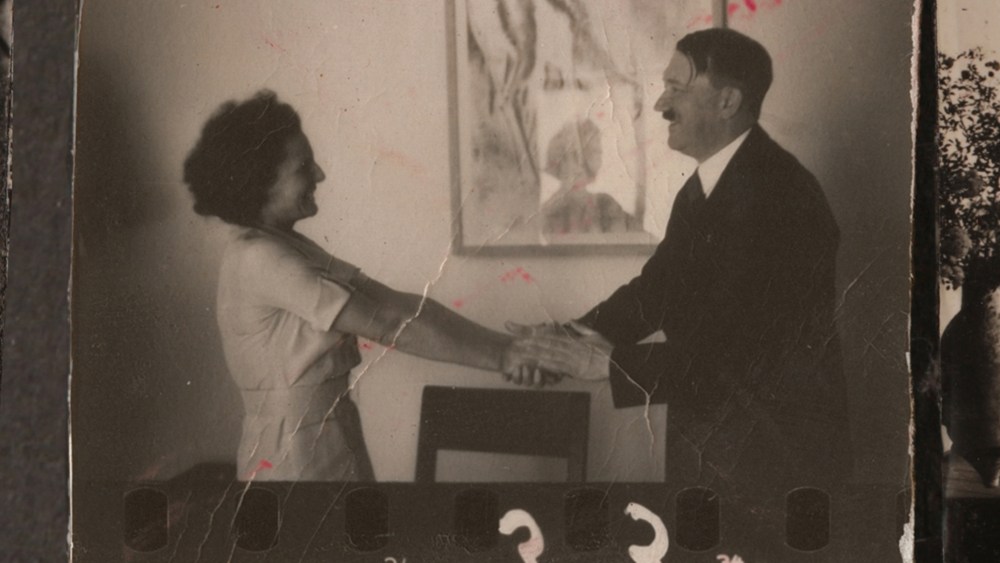To what degree was infamous filmmaker Leni Riefenstahl a Nazi collaborator who knew about Adolf Hitler’s concentration camps? In the documentary “Riefenstahl,” which debuted at the 2024 Venice Film Festival, director Andres Veiel examines this question using never-before-seen documents from Riefenstahl’s estate, including private films, photos, recordings and letters.
“We were quite conscious that she manipulated a lot and that she removed some things (from her archives),” Veiel says. “Our gift, in a way, was that she made mistakes. She left a lot of things in her estate that charged her with being much more responsible regarding her guilt or her complicity.”
Riefenstahl, who died in 2003 at age 101, is known for her documentaries “Triumph of the Will” (1935) and “Olympiad” (1938), which were lauded for their masterful technical skill. The docs, which are defined by their fascist aesthetics, were funded by the Nazis. Riefenstahl’s friendship with Hitler and other Nazi dignitaries was well documented during WWII. Yet, during her long life after the fall of Nazism, she remained unapologetic, spending decades denying her association with Nazi ideology and claiming ignorance of the Holocaust. She was never formally convicted of being complicit in the crimes of the Nazis.
Veiel, who calls Riefenstahl a “prototype of fascism,” said that making a doc about Riefenstahl became “an urgent necessity for me.”
“Now, as then, Riefenstahl’s visual worlds are about triumph,” says Veiel. “Triumph over doubt, ambivalence, supposed weakness, and the imperfect. Riefenstahl’s extensive legacy, reinterpreted in the light of her private estate, offered the opportunity for a new take on the timeless attraction of imperial greatness and the need for the staging of the trained, perfect, and victorious ones, as we see them on the rise today again.”
Variety spoke with Veiel about “Riefenstahl,” which is currently screening at Laemmle theaters in Los Angeles until Sept. 25.
There have been several documentaries made about Leni Riefenstahl, including 1993 Ray Müller’s lauded three-hour-long doc “The Wonderful, Horrible Life of Leni Riefenstahl.” Why make another doc about her life and work?
We took a huge chance (making this film) because there are a lot of films (about Riefenstahl) that are quite good. The challenge was, can we somehow get beyond the knowledge that we already have? Also, what does (her story) mean for today? I felt like it’s not a film on the past, it’s somehow a warning out of the future.
You said that in Riefenstahl’s estate there were a few gaps. Can you give an example?
We came across the announcement of a 1934 Daily Express interview with Riefenstahl, but the actual interview was missing. We then obtained it from the newspaper’s archives. Here, Riefenstahl declares that she had read Hitler’s Mein Kampf in 1932 and, after the first pages, had already become an enthusiastic National Socialist. Such a document would have demolished, in one fell swoop, the painstakingly constructed legend that she was an “apolitical person.” So, the question became, how can I approach a protagonist who not only in her life, but also in her estate did everything in order to maintain her legends, half-truths, and lies?
Do you think Riefenstahl should continue to be celebrated for her feature-film techniques? Should we separate the art from the artist?
Well, I don’t think we can separate art and politics, and she’s the best example, because she used her aesthetics to celebrate a dictatorship, a regime which was, in the very end, responsible not only for the death of six million Jews, but also for the deaths of 60 million people. But of course, she was a very good director, and she was even a better editor. We show excerpts from “Olympia,” such as the well-known high diving sequence. In this way, we give space to Riefenstahl’s celebration of the beautiful, strong, and victorious. The sequence still has a strong impact today. It would be wrong not to show it. What these images conceal, we tell elsewhere – in the context of the fate of the cameraman Willy Zielke, for example. He had shot the prologue of “Olympia” largely on his own. Shortly after filming, he had a breakdown and was committed to a mental hospital. Less than six months later, he was forcibly sterilized. Leni Riefenstahl was informed of this, but did not intervene. She didn’t give a fucking shit. She was just interested in her career, and there you can see she is part of the ideology – the contempt of the sickness.
I read that while making this film, you had moments where you had to force yourself to “not to simply turn away from (Riefenstahl).” How did you overcome this state of reluctance?
There is a life before guilt. Her life could have developed quite differently in the 1920s. Her enthusiasm for the Nazi regime did not begin in 1932. There were numerous biographical, historical, and generational influences in the decades before. The estate, together with other sources, gave us the opportunity to approach Riefenstahl in all her contradictions.

